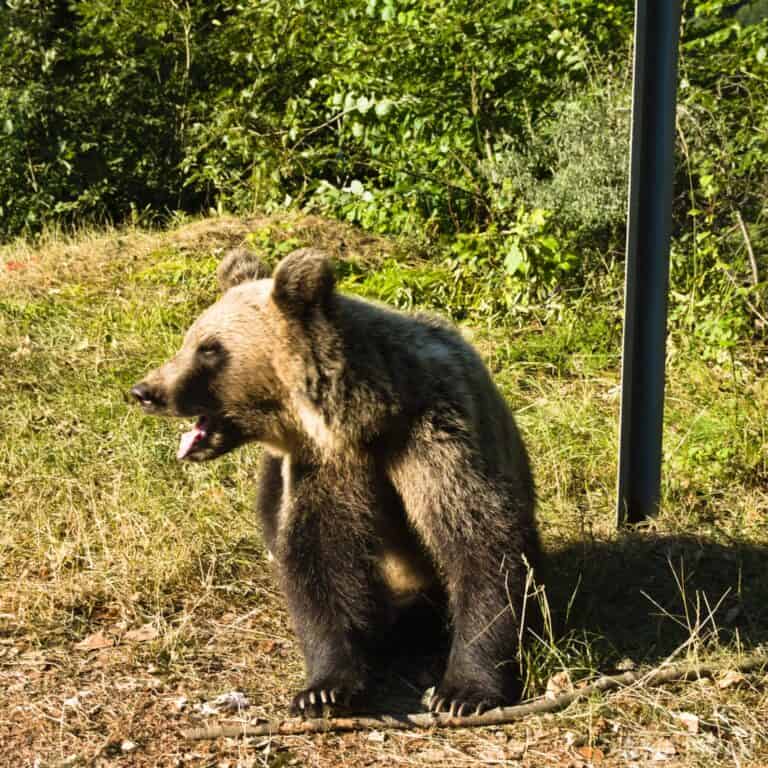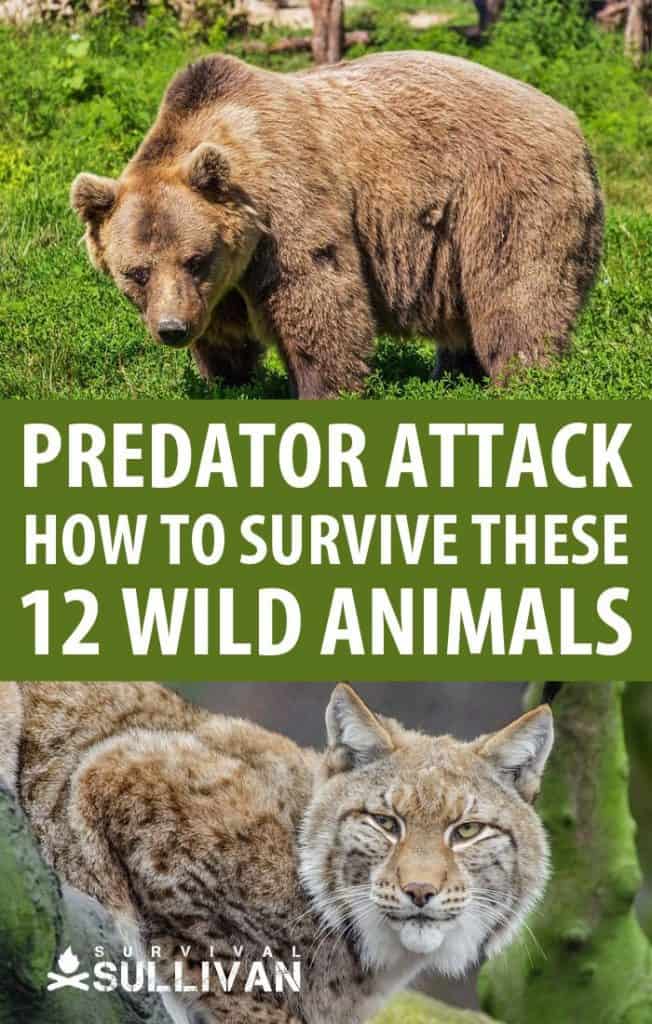In most cases, animals are more scared of us than we are of them. So what do you do when they are not? There are several predators in the US that will stand their ground against humans. Each one acts differently towards humans, so having some knowledge is key to surviving a situations like this.
My uncle owns about 400 acres in Southern Missouri, and we do most of our hunting on his property. Over the last few years he has spotted a big cat on his property.

There are also black bears and huge numbers of coyotes in the area. In most cases I do not worry about the risk, but when I am walking to my deer stand in the dark I sometimes think about that cat jumping on my back from above.
In this article I will cover some general rules for all predators along with specific advice for different animals. Hopefully it will help if you ever find yourself in this situation.
General Rules to Avoid Predators
- Avoid Food Smells – Most predators are attracted to food smells. To avoid this attractant, you must be proactive. This means cleaning your kill away from your camp, preferably over 100 yards away and near water. It means cleaning all of your dishes thoroughly. It means hanging all food storage from a tree at least 10 feet in the air and 100 yards from your camp. These actions will greatly help.
- Protect your tent – Never take food into your tent. The smell can linger and attract animals. Also never take clothing into your tent when having cooked in that clothing.
- Never feed animals – This will keep bringing them back. You may think that feeding the squirrels or raccoons is cute, but you are attracting the prey which predators hunt.
- Avoid pet food – This kind of food has a strong smell and can draw all kinds of animals to your camp. Try to avoid bringing your pets if possible.
- Build a fire – Almost all animals are scared of fire. If you can get a fire going, you can likely keep any predator away through the night.
- Keep your distance – The best way to avoid predator attacks is to not alert the animal. If you see a predator, slowly walk the other way. They will likely go about their business.
Black Bears
- Bears are most dangerous when you surprise them or you get between them and their cubs. Stay aware of your surroundings, and you should be able to avoid this situation.
- Never run. Bears will perceive you as prey if you run. Move slowly and deliberately.
- Keep children and pets close. They will be more likely to attack small children and pets as they could see them as food.
- Make noise and get big. If you can bang pots and pans together or yell loudly, that could scare the bear. Also wave your arms and open your coat to make yourself appear larger.
- Do not block the bear’s escape route. Always make sure the bear has an easy route to get away. This will make the bear feel less threatened.
- Try to get upwind. By staying upwind you keep your scent in the bear’s face. This will alert them that you are human and are a threat. They will likely leave the area.
Grizzly Bears
- Grizzlies are more aggressive, so they have to be handled with caution. Always speak softly as you back away from a grizzly.
- Never turn your back on a grizzly. Even if you do not run, it could make you appear to be prey.
- Make lots of noise in grizzly territory and hopefully that will scare them away before you get close. Man-made noises do a good job to get them running.
- Do not make eye contact with a grizzly. It will see that as a sign of aggression and be more likely to attack.
- Grizzlies will sometimes bluff charge to see if you will run. Stand your ground, but if it pins its ears back and lowers its head, he is coming for real.
- If the bear attacks, cover your head and lie still on the ground. Playing dead will sometimes cause the bear to lose interest.
- If the bear is threatening your life, attack the eyes and nose. These are areas that are highly sensitive and might cause the bear back off.
Here’s everything you need to know about surviving brown, black and grizzly bear attacks.
Polar Bears
- These bears are desperate for a meal. They are not used to humans, but will stalk one hoping for an easy kill. If they charge, they are not bluffing.
- Make lots of noise. Because they are not accustomed to humans, this will often scare them off.
- Stay with your group. Polar bears are much more likely to attack a person on their own versus a group of people.
- If the bear attacks, go for the nose and eyes. Again, these are sensitive areas that could get the bear to run.
Cougars
- Cougars are one of the few animals that will follow a human looking for an opportunity to strike. If it lets you see it, you are in trouble.
- Never run. Instead stand tall and quietly face the animal.
- Stay in your group. Cougars typically go after a lone hiker versus a group of people.
- Do not do anything to make yourself look larger. The cat will see this as a threat and attack.
- Never turn your back or break eye contact. The cougar will see this as an opportunity to strike.
- If the animal start to approach, this is the time to try and scare it off. Make noise, throw things, and do whatever you can to get it to back off.
- When the animals attacks, you have to stay on your feet. If it gets you on your back, the cougar will likely get your neck and the fight is over.
- If you have to fight, go for the eyes. This is likely your only chance of survival.
- Cougars are sometimes hesitant to head into water. If you have a body of water close by, start swimming. It might give you the distance you need to survive.
Wolves and Coyotes
- These are cunning pack animals and with rising numbers, and attacks are more common. They will stalk their prey and find the right moment to disable its legs. Then the pack will swarm once you are on the ground.
- Never try to run. These animals can run at least twice as fast as the fastest human. They will see you as prey.
- If they let you see them, you are in trouble. They rely on staying hidden until ready to attack.
- If you are alone and surrounded, take the offensive and start attacking. At that point it is almost a guarantee that they will try to kill you.
- Do not allow yourself to slip or trip. The opportune time for them to attack is when you are on the ground.
- Make lots of noise to scare them off. Often coyotes in particular will scatter if you make loud noises.
- If you are in a group and a pack emerges, prepare for battle. Stand back to back and find anything sharp for a weapon to go for the eyes and noses.
- Climb a tree if possible. This will eliminate the immediate risk, but do not be surprised if they wait it out at the base of the tree.
Hyenas
Hyenas are nocturnal pack animals and rely on their speed instead of stalking. They can smell blood from two miles away, so be cautious if you have been injured. As usual, do not run and make lots of noise.
Watch your periphery as they will often attack from the side as you focus on another hyena directly in front of you. They are most likely to attack sleeping humans, so select your bed carefully. They do not climb, so trees are a good idea.
Crocodiles
Crocodiles are most dangerous in or near water. They prefer small prey like dogs and children, but will attack humans if startled or nesting. Be cautious any time you are near the edge of the water, and avoid swimming and boat rides in crocodile waters.
They are also more likely to attack at night or at dusk. If you are charged by a crocodile on land, run away as fast as you can. A healthy human can outrun a crocodile on land. If you are bitten, the crocodile will likely try to drag you to water. Jab at the eyes to get the animal to release you.
Sharks
Sharks are one of the least likely predators to attack a human, but it does happen. Try to avoid swimming in areas where rivers spill into the ocean.
Also, avoid areas with fishing boats. The movement and smell of the fish will attract sharks. If you are being circled, maintain eye contact and do not expose your back. Try to slowly back away, and go for the eyes if the shark comes after you.
Lions
Of course your best option with lions is avoidance or deterrence. Building a boma with thorny brush is helpful, and a fire is always a good idea.
If you do have to face a lion, stand your ground, make loud noises, throw rocks, and grab any weapon you can. Most charges are a bluff, so make sure you do not run. Back away slowly, but freeze if the lion starts to follow.
Tigers
As with any cats, making yourself look larger and making noise is a good idea. Try to avoid old or injured tigers as they account for most human attacks. If you are walking in an area with tigers, consider wearing a mask on the back of your head.
This will often make a stalking tiger think you are looking at them before you even see them. Unlike other cats, do not make eye contact and consider climbing a tree. Tigers are not nearly as skilled at climbing as other cats. Learn more on how to survive a tiger attack here.
Wrap-Up
Every situation is different, but these techniques have helped people survive animal attacks in the past. In the end, you have to use your best judgement. If you find yourself in one of these life threatening situations, hopefully you will remember some of these tips.
In a few months I am heading into the woods for a winter survival challenge. I know predators are more desperate for food during the winter, so I am a bit concerned about those animals
However, I know that I will have the tools I need to handle the situation if it does arise. Hopefully I am lucky enough that I can avoid that situation altogether. I guess we will see.


My name is Ryan Dotson and I am a survivalist, prepper, writer, and photographer. I grew up in the Ozark Mountains and in the foothills of the Pocono Mountains. My interest in survival started when I was in Boy Scouts and continued as my father, uncle, and grandfather taught me to hunt and fish. In the last few years I have started taking on survival challenges and have started writing about my experiences. I currently live in Mid-Missouri with my wife Lauren and three year old son Andrew.

I have honestly become a prisoner in my own home this morning. It is a beautiful day in West Cork Ireland and I was looking forward to a day outside in the winter sunshine. The daylight hours are short so one needs to get out early. I have two beautiful (to behold) cockerels of whom I am very fond. This morning both of them attacked me at the same time and are now stalking both the back door and front door of the house. Over the past few months, I have tried grabbing the big white fella and walking for half an hour with him under my arm. I have grabbed his legs and swung him up into the air. These things have worked for a week or so but they have both now become very dangerous. Eventually their crowing in the morning is going to attract the fox. Reading your article I realise that planning ahead is imperative to keeping ourselves safe. Here in Ireland we have had an escaped lion wandering the streets so everything is possible! When I next put eggs in the incubator I need to prepare for violent, dangerous roosters to emerge.
I bet an angry cockerel attack is a frightening thing to go through. Better ammo up, brother.
Ryan – Good information – Live on a ranch in western Montana – Check your facts in Cougar, 4th bullet down… I think you mean make yourself look big. If not… you contradiced yourself in Tigers, 1st sentence – Take Care Alan
good catch on contradictions, and I caught that too
Missed wild hogs. There are plenty of them in the US. They’re fairly shy, but will attack without warning and won’t back down. Razor sharp tusks and very hard teeth. Usain Bolt couldn’t outrun one. Best to avoid altogether
Correct info on Sow and cub Black Bear. It’s the big Boars that will hunt or chase you down to eat you. If you have a large Bear by itself come at you and or start to circle you prepare for a fight for your life. This happens more often in areas where there is little hunting and few humans but can happen any time or place.
I don’t know why the author treats this as though we’re sitting ducks who’d wander around like defenseless predator bait? With the exception of the shark, you should always be armed when in the habitat of any of these predators. Even bear spray is a great deterrent, I’ve used it once with great success. With wolves or coyotes, if you shoot one of them, especially the alpha, they’ll flee.
We have a small ranch/farm & have always had a few coyotes hanging around at a distance. But this year we noticed that they are larger than a German Shepherd. They no longer run when they see you, and will even stop and growl at you from a short distance. I don’t know if they have interbred with dogs or wolfs but they are very large & frightening; certainly not the coyotes of the past.
I don’t believe the author is trying to make us feel like we are “sitting ducks”, but there are a lot of folks, especially city bred who have no idea what they are up against with one of those “beautiful” creatures. Better to be reminded than to be bitten!!